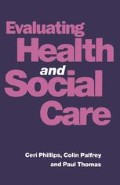Abstract
The term ‘efficiency’ is often misunderstood and confused with the term ‘economy’. Whereas economy is concerned with the costs involved in providing services, efficiency deals with the relationship between the inputs (costs) on the one hand and the outputs and/or outcomes (benefits) of services on the other. Efficiency seeks to assess what resources are used in providing services and what the services actually produce; in short it is the ratio of total benefits to total costs. Therefore, whilst financial costs are taken into account efficiency goes beyond a purely financial appraisal of a scheme to include broader issues, such as the inputs of care provided by family and friends in caring for people in the community or the effects of treatment on quality of life. What appears to be the most economical treatment is not necessarily the most efficient. For example, a scheme designed to discharge longterm patients from a psychiatric hospital due to close, to the cheapest alternative, such as health authority houses on a large housing estate in an area of relatively high deprivation, may well result in many additional costs being incurred both by the authorities and by society as a whole.
Preview
Unable to display preview. Download preview PDF.
References
Bryan, S. et al. (1991) ‘Chiropody and the QALY: A case study in assigning categories of disability and distress to patients,’ Health Policy, 18, pp. 169–85.
Department of Health (1989) Working for Patients, Cmnd. 555, HMSO, London.
Drummond, M.F. et al. (1987) Methods for the Economic Evaluation of Health Care Programmes, Oxford University Press.
Horngren, C. T. (1972), Cost Accounting: a managerial emphasis, Englewood Cliffs, NJ Prentice-Hall.
Jarman, B. (1983), ‘Identification of underprivileged areas’, British Medical Journal, 28 (August), pp. 1705–9.
Jones, R. and Pendlebury, M. (1988), Public Sector Accounting, Pitman, London.
Palfrey, C. Phillips, C., Thomas, P. and Edwards, D. (1992) Policy Evaluation in the Public Sector: approaches and methods, Avebury, Aldershot.
Teeling-Smith, G. (ed.) (1988) Measuring Health: a practical approach, Wiley, London.
Williams, A. (1990) ‘Ethics, clinical freedom and the doctors’ role’, in Culyer, A.J. et al., Competition in Health Care: Reforming the NHS, Macmillan, Basingstoke.
Williams, A. (1985) ‘Economics of coronary artery bypass grafting,’ British Medical Journal, 291 (3) (August), pp. 326–29.
Copyright information
© 1994 C. J. Phillips, C. F. Palfrey and P. Thomas
About this chapter
Cite this chapter
Phillips, C., Palfrey, C., Thomas, P. (1994). Evaluating Efficiency. In: Evaluating Health and Social Care. Palgrave, London. https://doi.org/10.1007/978-1-349-23132-4_4
Download citation
DOI: https://doi.org/10.1007/978-1-349-23132-4_4
Publisher Name: Palgrave, London
Print ISBN: 978-0-333-59186-4
Online ISBN: 978-1-349-23132-4
eBook Packages: Palgrave Social & Cultural Studies CollectionSocial Sciences (R0)

